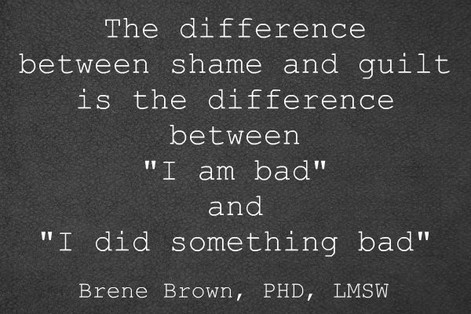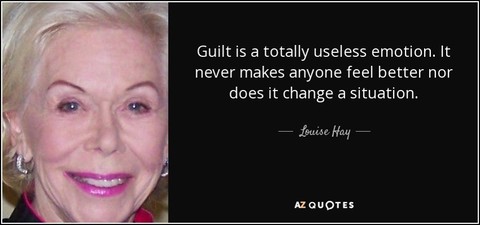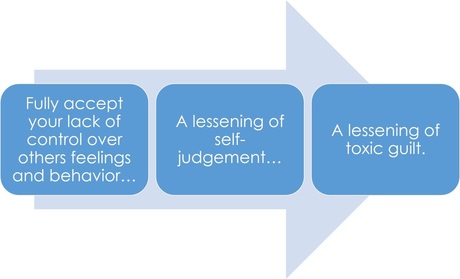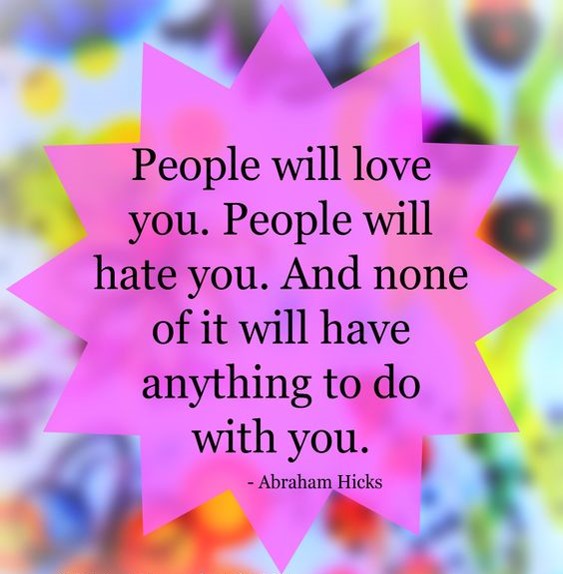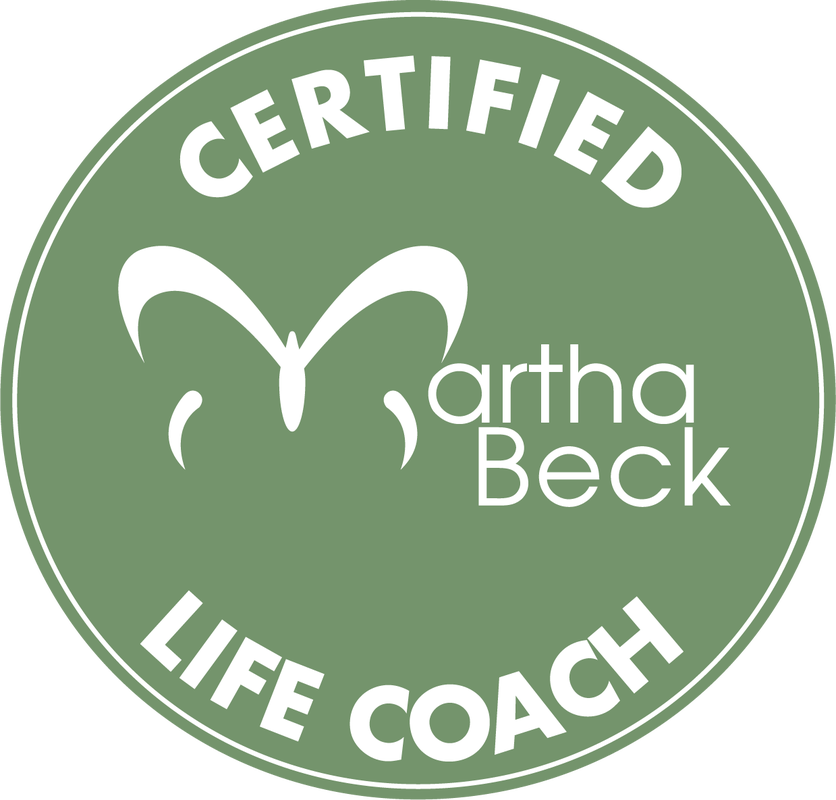|
Let’s be clear… I possibly have an addiction to personal growth. This addiction is not new as an adult at least – I love to learn, read, gain knowledge. I’m guessing if any of my high school teachers read this they would be shocked, because I was not a huge fan of school at the time I was officially in it!! One of the things I am currently doing on this front, is taking Dr. Margret Paul’s “30 Day Love Yourself Inner Bonding Course”. Each day you receive an e-mail or a video with insights into the ways we prevent being true to ourselves or loving ourselves through our limiting (and false BTW) beliefs. This info on shame and guilt are from that course and it kind of blew my mind because it so turns my whole thought system about what shame and guilt are about, on its’ head. I am still trying to wrap my brain around it somewhat. Dr. Paul agrees with the work of shame researcher Dr. Brene’ Brown: Shame is the feeling that there is something basically wrong with you. Whereas the feeling of guilt is about DOING something wrong, shame is about BEING wrong at the core. The feeling of shame comes from the limiting (and untrue) belief that “I am basically flawed. Inadequate, wrong, bad, unimportant, underserving, fat, or not good enough” I didn’t used to think that I carried shame – but by this definition, I do. We ALL have something someone told us about ourselves that we continue to carry as a shame story today. All these years later, after some early point in our lives, most of us absorbed a false belief that causes us feelings of shame as a result of not feeling seen, heard, loved, understood, valued. Or it might be some other value statement someone put on us with a comment, or many of them, and we developed a belief that there is something “wrong” with us. Once we establish this core limiting belief, we become kind of addicted to it, because it actually seems to SERVE us in a couple of key ways. This next part of the info today, kind of blew my mind a bit, because it is such a different way of seeing what we do to ourselves by hanging onto our shame stories and limiting beliefs… Reason #1 we hang on to our shame story: It gives us a feeling of control over other people’s feelings and behavior. Hear me out on this one because I know this is a whole new way of thinking of shame… As long as we believe that we are the cause of others’ unloving behavior, then we can believe that there is something WE can do about it. It gives us a sense of power to believe that others are rejecting us or behaving in other unloving ways because of OUR inadequacy. If it’s our fault, THEN MAYBE WE CAN DO SOMETHING ABOUT CHANGING IT BY CHANGING OURSELVES. By doing things “right”. We hang on to the belief that our inadequacy is causing others’ behavior because we don’t’ want to accept their free will to feel and behave however they want. We don’t want to accept our helplessness over others’ feeing and behavior. “It must be me”, “I must have done something wrong”, let’s us believe that if we can just get it right and behave or be a certain way, we can get that person to like us, accept us, we have CONTROL of how they feel about us and treat us. We seem to have a belief that what others think or feel about us, as a result of what we do or who we are, is under our control somehow. As Joy continues to tell me “what someone else says is simply information to consider”. It doesn’t then need to be what I take on as a belief about myself or what I know to be true for me. It’s all just INFORMATION. The difference though is that GUILT is not information. Guilt is a result of people pleasing or attempting to people please. Guilt serves no purpose other than to make us miserable because most guilt humans feel is classified as “unhealthy guilt”. Guilt is not helpful AND it keeps us from living up to our full potential. More about guilt definitions as you read further in this blog. When I’m talking about guilt it is an action that has a SHOULD attached to it.
1. Look at the consequences of your choice that you are feeling guilty about. 2. Apologize if it’s someone you have an agreement with that you have broken 3. LEARN a lesson – is your guilt something that borders on shame due to an old wound or story??? 4. Move on Reason #2 we hang on to our shame story It protects us from other feelings that we are afraid to feel, and gives us a sense of control over our OWN feelings. As bad as shame feels, many people prefer it to the feelings that shame may be covering up – loneliness, heartbreak, grief, sadness, helplessness over others. Just as anger may be a cover up for these difficult feelings, so is shame. Shame is a feeling we cause by our own false beliefs. Loneliness, heartbreak, grief, sadness, suffering… we often see as being caused by others. So once again, we feel that we have some CONTROL when we hang on to shame vs. feeling our actual painful feelings. Some signs of being addicted to our shame might sound like this…
Your shame story may have been absorbed from what others said, did, when you were a child and then, we carry on this either comment or many comments or a one-time behavior or one that was on-going - by continuing to shame OURSELVES. We cause our own suffering by building on the story. And trivializing or diminishing what happened to you as a child is in itself self-abusive. If a child comes to you and tells you of some pain inflicted on them, you would take it seriously – not just say “I don’t believe you” or “It’s not a big deal” or “get over it”. Yet this is what we do when we don’t allow ourselves to feel our painful feelings. Unhealthy guilt comes from telling yourself a LIE. It comes from the critical part of you that wants to control how others feel about you and so tells you the lie that you are responsible for others’ feelings. Unhealthy guilt also pops up when someone blames you for their feelings. Here’s an example… Suzy feels guilty when she talks to her mother. “No matter what I say my mother always seems to feel hurt and then I feel guilty for hurting her. I don’t even want to have a relationship with her, I hate feeling guilty all the time.” Suzy’s feelings of guilt are not coming from actually inflicting harm on her mother. Her feelings are coming from the self-judgement that she absorbed from her mother’s judgments of her and others. Her guilt is coming from the fact that she is telling herself she is doing something “wrong”. If Suzy didn’t believe that she was responsible for causing others’ feelings, she would not feel guiltily when her mother or others blame her for their feelings. Suzy WANTS to believe she is causing others’ feelings because it gives her a sense of control over how others feel about her. It goes like this… “If I can cause others to be hurt or upset, I can also cause them to be loving and accepting. If I just do things right, then I can control how others feel about me and treat me.” It gives us an illusion of SAFETY. The belief that you can control others’ feelings and behavior by doing things “right”, which leads to self judgement to control your own behavior, which leads to toxic guilt. The way OUT of toxic guilt is to: So, how do we heal our shame?
When you are willing to accept that others’ feelings and behavior have nothing to do with you. When you accept that others have free will to be open or closed, loving or unloving – that you are not the cause of their feelings and behavior and you no longer take others’ behavior personally. Then you will have no need to control it. You will let go of your need to control others and instead move into compassion for yourself and others. You will let go of your beliefs about yourself that cause a feeling of shame. This understanding that others reactions to you are not in your control also ties back to taking responsibility for your OWN emotions vs. making them someone else's’ job. Take on the responsibility of defining your OWN worth. It’s about making your relationship with self and your Source your most important relationship rather than making someone else you “Higher Power”. And when you are willing to feel your authentic painful feelings rather than cover them up with anger or shame. When you learn to nurture yourself by being present with caring and compassion for you own painful feelings, you will no longer have a need to protect against these feelings with blame or shame. The idea that control and shame are intricately tied together kind of blows my mind. I have thought that statements like “it must be my fault somehow” “there’s something wrong with me” were based in being a VICTIM. This different perspective actually makes more sense to me! So it’s about choosing self-compassion and compassion for others OVER choosing to attempt to have control. Shame also seems to me to have a close tie to being focused on OUTCOMES. Trying to manipulate the outcome to the one I desire is a strong force in me and what makes for a good sales person and leader! But using that in intimate relationships, outside of business – is an attachment to control and outcomes that doesn’t serve me like it does in business. So my assignment to you would be: AWARENESS without judgement of yourself.
XOXOXOXOXO Sandy
1 Comment
2/25/2020 12:30:06 am
I think that this blog centered around natural toxicity within our society. I know that this is an established fact, but I still want to give you credit for it. Shaming others will never be a great thing, but it is fine for most. I do not know how they can do it, but they are just too cold hearted to understand that they are doing. I want to be part of a society that does not allow for toxicity to run rampant.
Reply
Leave a Reply. |
Sandy Edie HansenI use this space to "Chat" about things I am working through and learning in my life currently. Join me! Archives
September 2022
Categories |
Proudly powered by Weebly

